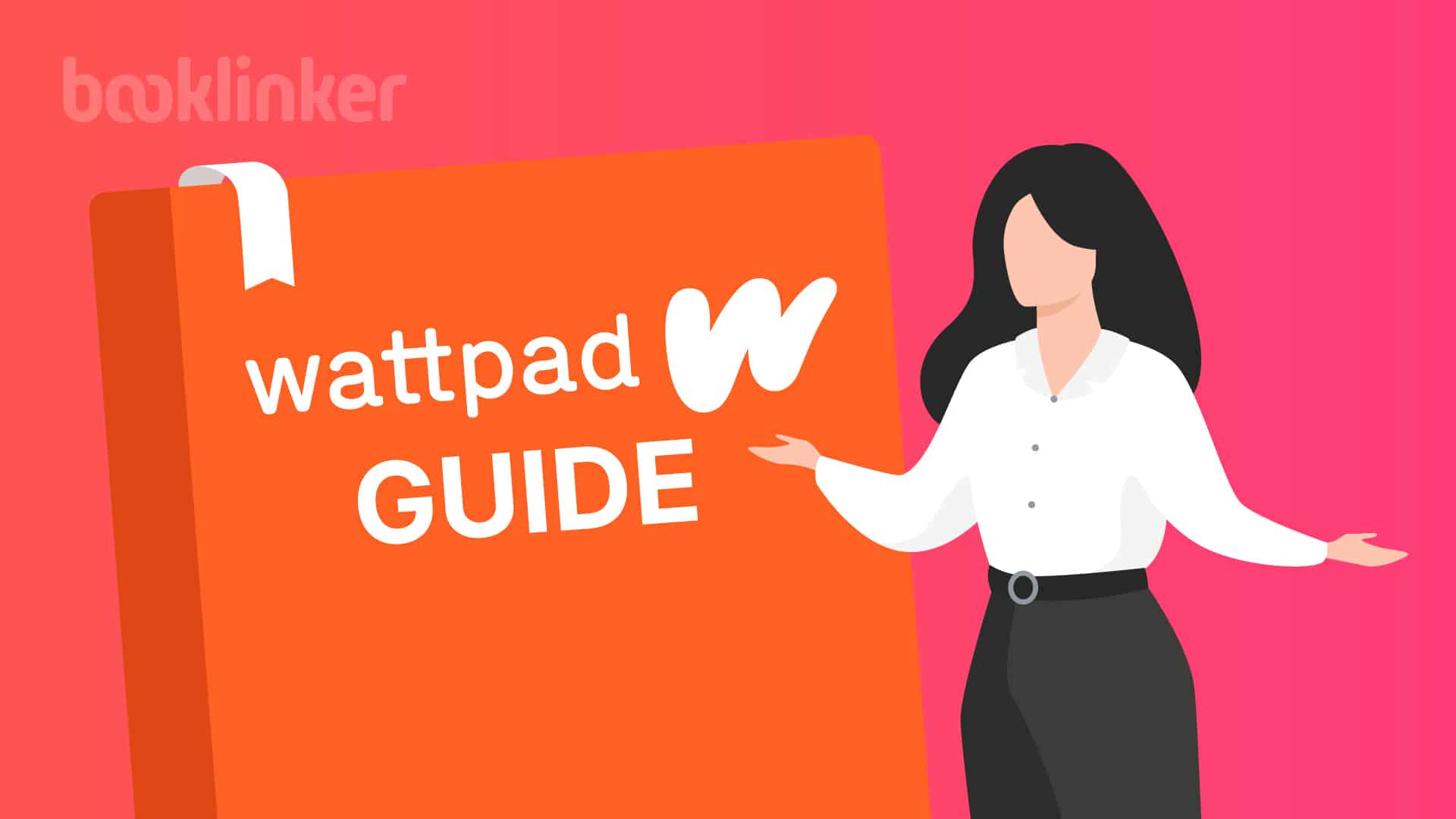
Author websites are an essential part of any author’s book marketing strategy.
It’s the glue that connects all marketing channels together.
An author website done properly allows website visitors to join their email list, follow them on social media platforms, and much more.
Not all authors are technical and have the means and know-how to set up a website.
In order to help steer authors in the right direction on their author websites, the Booklinker team spoke to Pauline Wiles, an indie author turned website designer who helps other authors create attractive websites that engage readers and sell more books.
If you’d like to learn how to set up an author website of your own or learn more about best practices for an author website, then keep reading!
At the very end of the article, we’ll also include some examples of successful author websites for you to draw inspiration from.

Key Takeaways
- Essential Marketing Tool: An author’s website is key for marketing, serving as a central link to all other marketing channels.
- Technical and Design Considerations: Not all authors are tech-savvy, so choosing a platform like WordPress, Squarespace, or Wix can help authors set up a functional, user-friendly, and accessible design.
- Content, SEO, and Promotion Strategies: Search engine optimization efforts will increase an author’s website visibility. Setting up lead magnets for email capture can help an author grow their list.
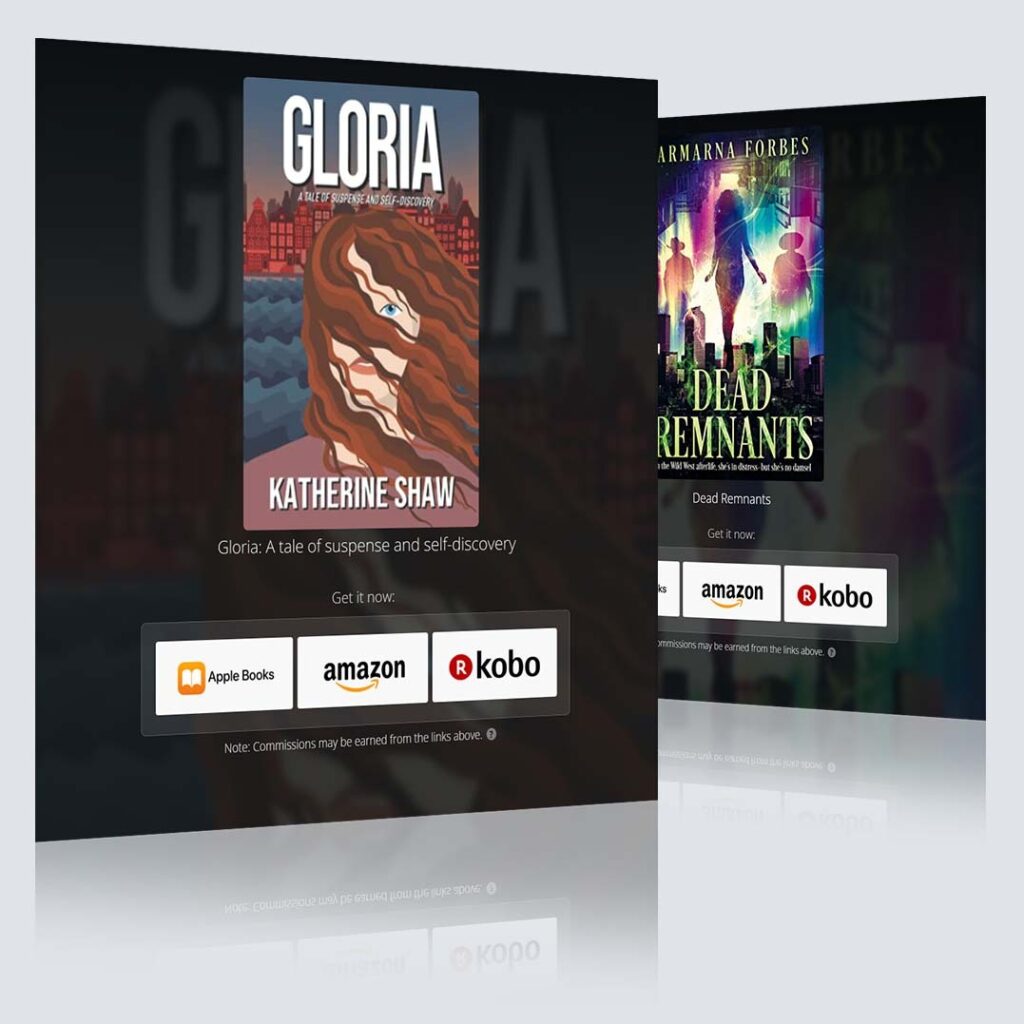
Free Universal Book Links
- Boost international sales by geotargeting readers
- Book store links update automatically based on availability
- Advanced marketing analytics
- Increase clicks with trusted links
Planning Your Author Website
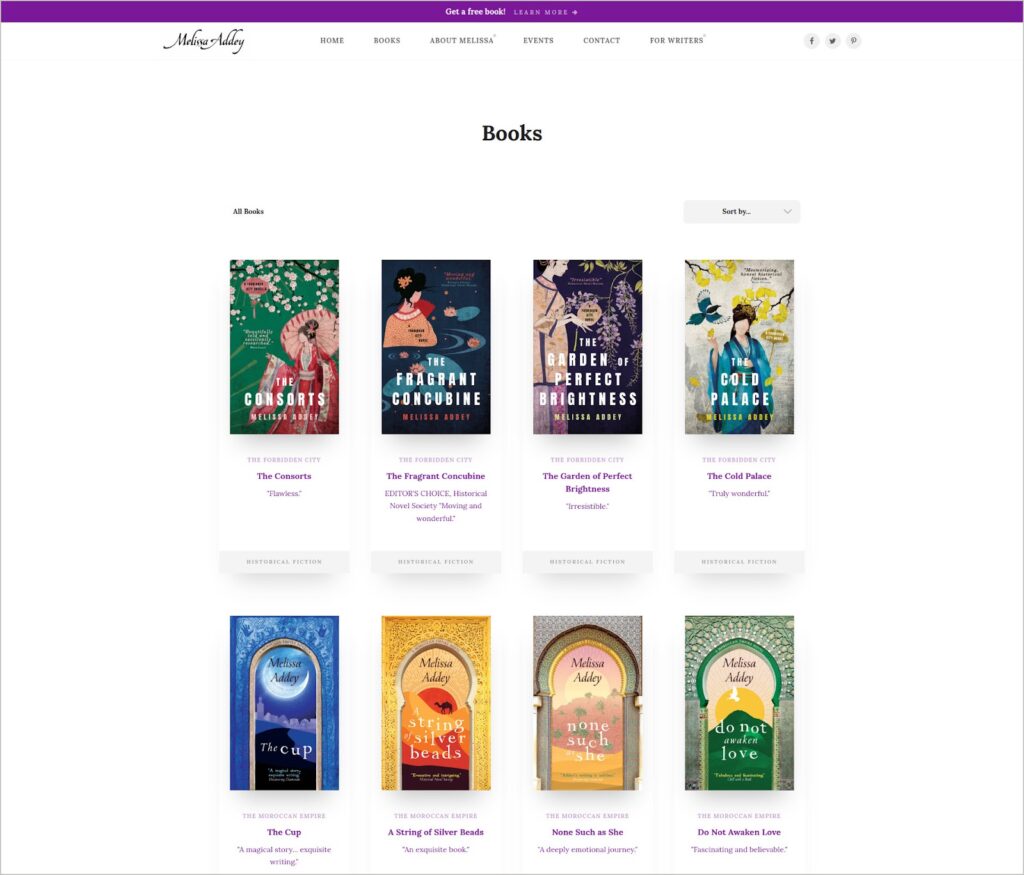
Before starting any work on your author’s website, you should first identify what your goals are with the website.
In my opinion, an author’s website should do a few things.
First off, it should make an author appear professional in their online appearance by looking clean and following web design best practices.
This doesn’t necessarily mean your author website needs to be fancy and/or expensive.
After that, the structure and content of your author website should depend on two things:
- Your overall goals for your author career
- The ideal action you want a visitor to take, after they’ve viewed your site.
Most likely, your author website should showcase all of your books and direct readers to where they can make purchases.
You might also want to include press appearances or works in progress, but don’t treat your website like a Wikipedia of your entire career. Focus on what your visitor needs to see.
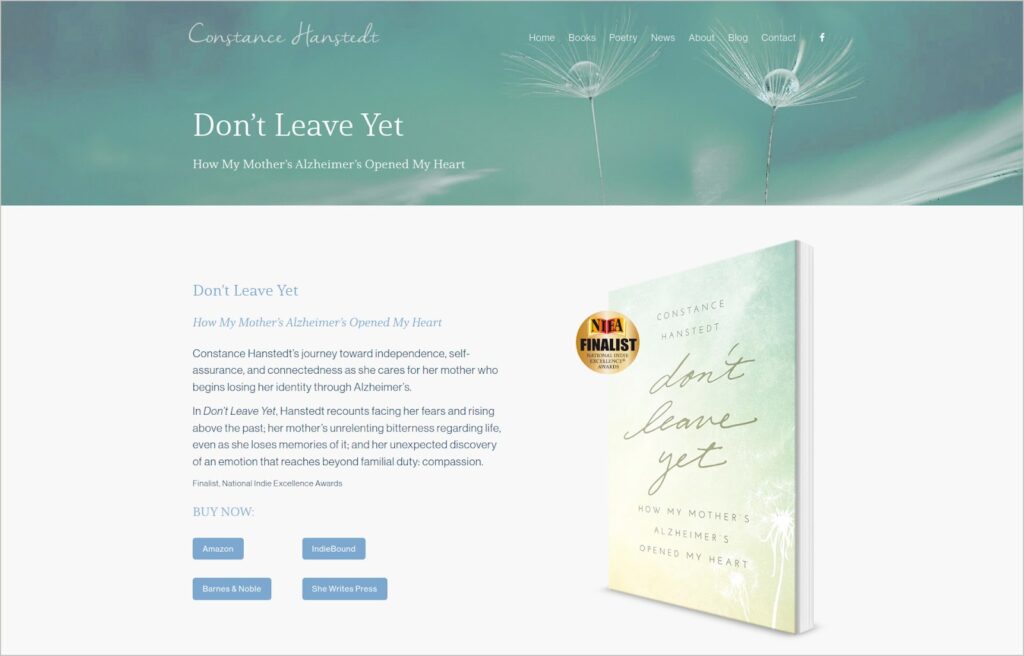
Once you’ve published a simple author website, a great next step would be to set up an email capture system so that you can form an ongoing, authentic relationship with readers through email marketing.
It might be a leap to go from a first-time visitor to a book sale.
By capturing emails we can nurture website visitors and sell not just your current book, but future books too.
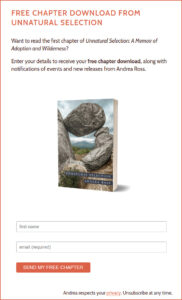
Eventually, you might want to consider optimizing your author website for increased discoverability in search engines (SEO). This can help bring targeted organic traffic to our websites.
Realistically, SEO is a tactic that works better for nonfiction authors, but even novelists should take basic steps to make sure their website is mobile friendly, loads fast, does not contain broken links, and has a few keywords placed in the proper locations.

In the above screenshot, KJ is ranking for a keyword relating to her books, but ideally, we want to be ranking for keywords unrelated to our book titles, in order to reach audiences that aren’t familiar with us already.
Picking a Domain Name
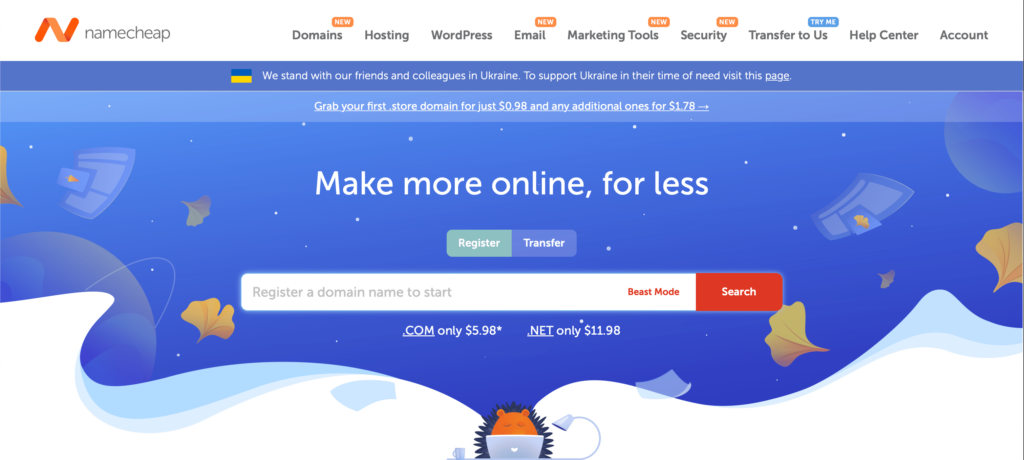
When picking a domain name for your author’s website, the structure (First Name)(Last Name).com is ideal.
Unclaimed .com domain names cost around $14/yr so they’re very affordable. If you’re seeing a higher price, it’s likely due to the domain name being claimed already.
Unless you’re dead set on that domain name, come up with an alternative. You can try adding something like your middle initial or “author”/“writer” to the end of it.
If your work pertains mainly to a specific country, country-specific domain endings such as .co.uk can be considered, but .com’s are still the most common approach.
Domain names can be purchased with registrars such as Namecheap and GoDaddy, or the company where you’re hosting your website
One mistake I made when I was first starting out, was branding the domain name to the book title. This may work for your first release, but will only cause confusion afterwards.
Tip!
- Domain names can be 301 redirected so it’s not the end of the world to change it later, but it’s better to start with your author name from the beginning
Building the Website
After the planning phase is done, and you’ve acquired a domain name, it’s time to start building.
From here you have a choice to make, to either build it yourself or hire a service.
In my experience as a web developer specifically for authors, most authors don’t have the skills, time, or inclination to build a professional-quality website.
By hiring a web development service they can ensure quality and avoid technical issues. This also frees up their time to do the highest-leverage task: writing more books.
If an author is budget-conscious, they can still build a website on their own, but in this case it’s vital to keep it simple.
Assuming an author is technically competent, they should be able to build and maintain a website with little to no issues.
Most authors severely underestimate the amount of time it takes to do this, and I see very few homemade author websites that achieve truly professional-level design.
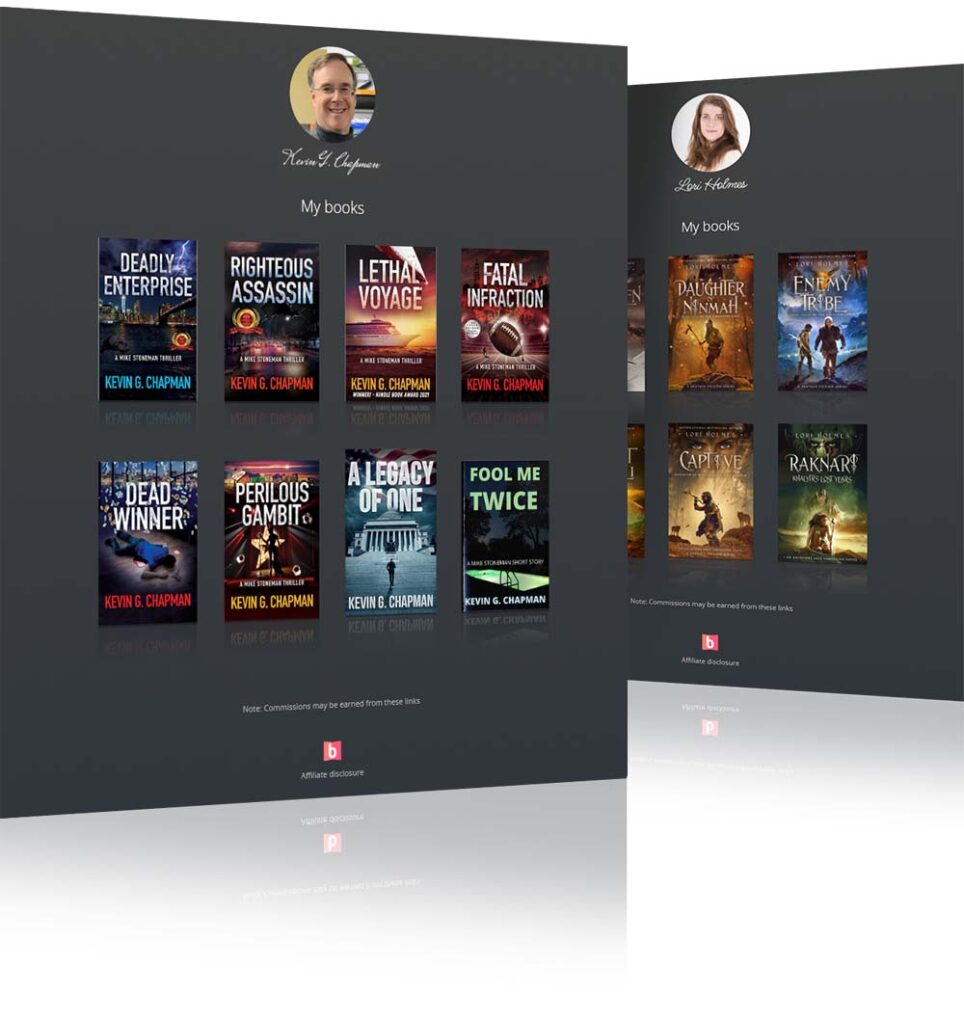
Introducing:
Booklinker Collections
One landing page for all your books. 100% free.
One link for easy sharing of your books across your backmatter, websites, emails, and social media.
Picking a Website Platform
Once an author is ready to move forward with their website, they have to decide their technology stack or “platform.” Websites are rarely hand-coded from scratch anymore.
The main choices for an author are a self-hosted site on WordPress, or an all-in-one service like Squarespace or Wix.
Below, I’ll describe briefly the pros and cons of each. Note that the costs of professional web development can vary greatly, and will directly reflect the skills, book marketing experience, and geographical location of the person you hire.
WordPress
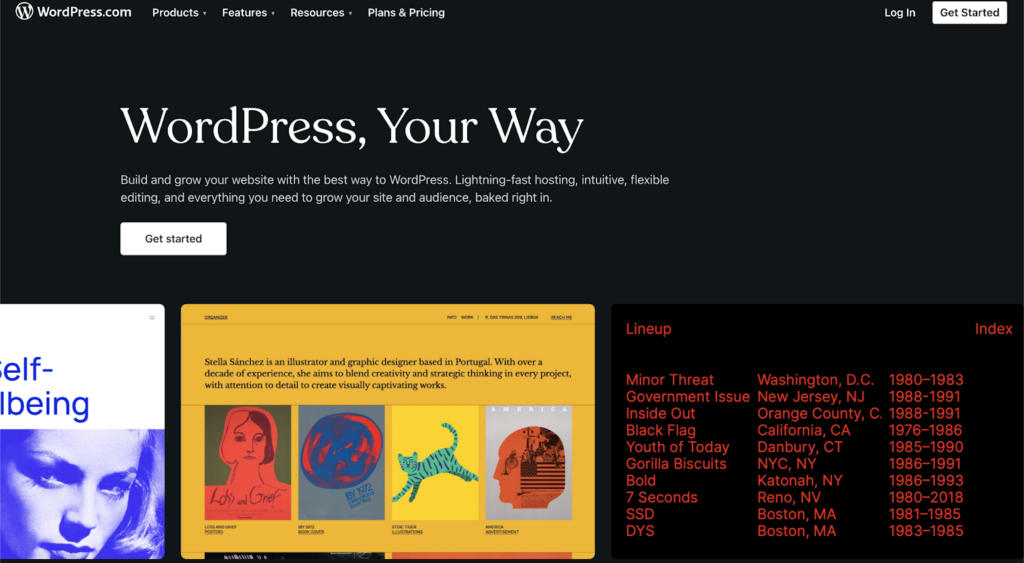
WordPress is a dominant and widely recognized website-building and content management platform and is suitable for more hands-on authors, with a higher level of technical comfort, or authors with higher budgets who will have someone on retainer to help.
The main drawback of using WordPress for your author website is that while it’s seemingly cost-effective at the start, it might have unforeseen costs later, especially if you encounter security issues or want to use paid plugins.
WordPress does offer the most customization of all the platforms due to the massive ecosystem of plugins.
Mandatory Projected Expenses:
- Domain name registration ($1.165/m)
- Website hosting costs ($14-$20/m)
- Potential plugins
Optional Projected Expenses:
- Website Creation Service (Varies)
- Website Maintenance Service (Varies)
Squarespace & Wix
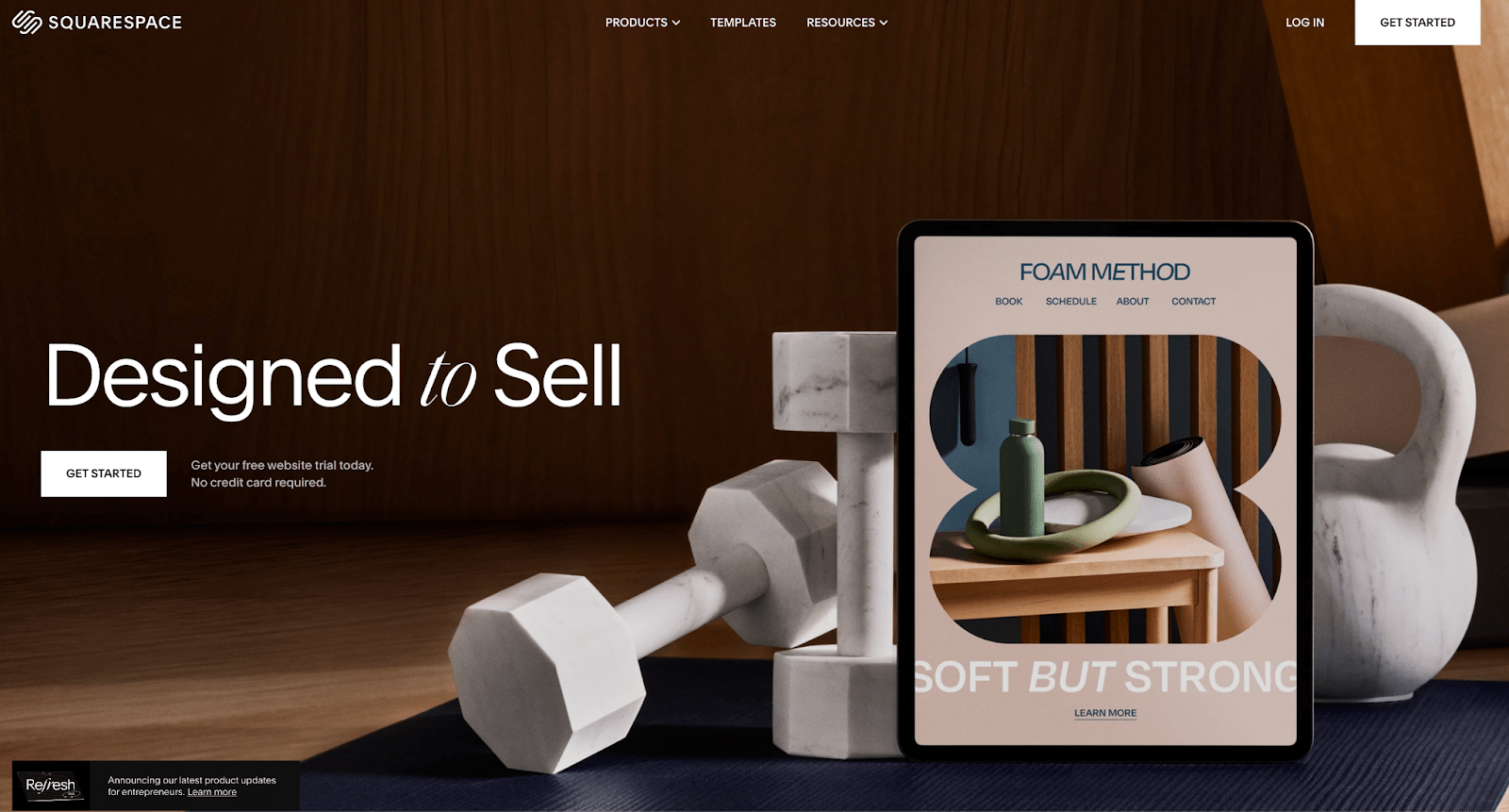
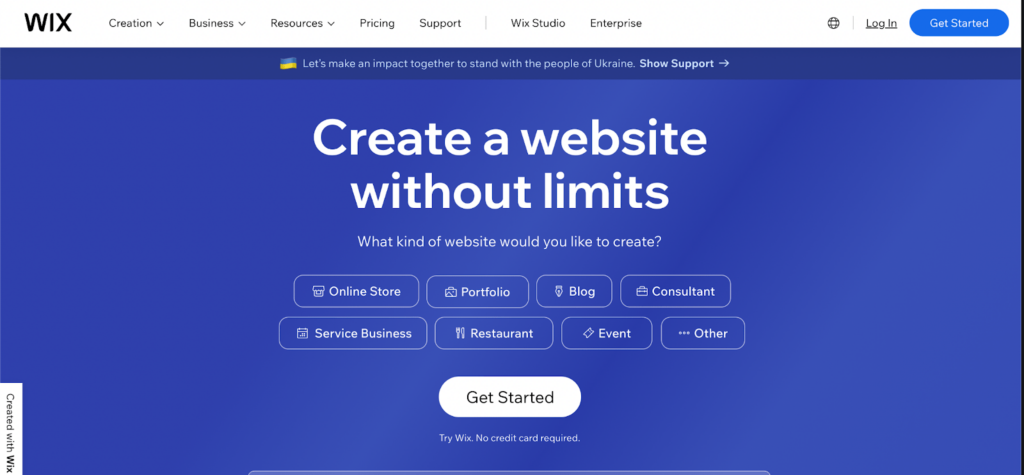
Squarespace and Wix function relatively similarly so I’ll talk about them together, although note that Squarespace has a stronger reputation for SEO.
They’re both WYSIWYG (What You See, is What You Get) editors, meaning that you can drag-and-drop your page designs, without worrying about code and technical elements.
Both of these services have a single subscription that covers the tool and hosting. These platforms are ideal for those seeking a more straightforward interface without the hassle of continuous maintenance.
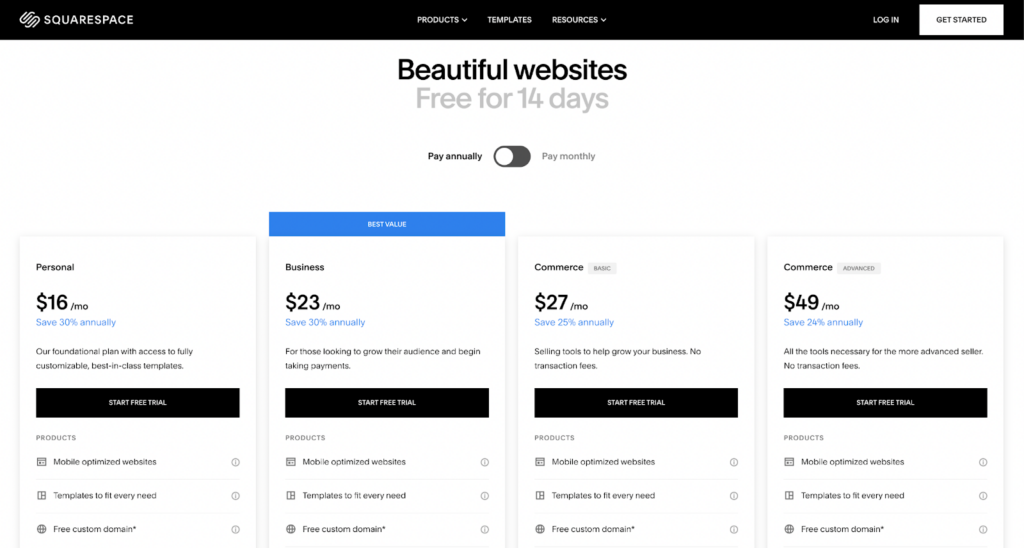
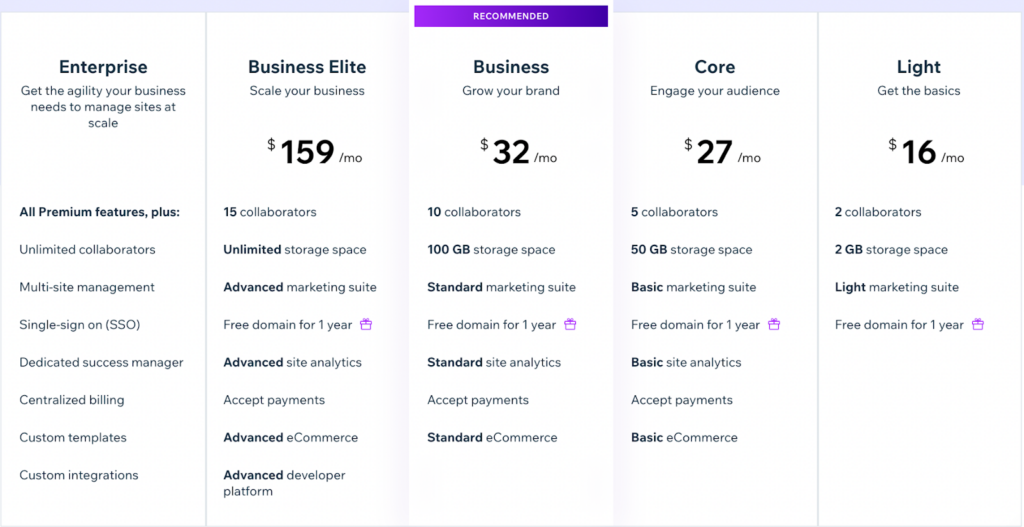
Mandatory Projected Expenses:
- Squarespace subscription (from $16/m)
- Domain name registration (First year is included in subscription cost, $1.16/m afterward)
Optional Projected Expenses:
- Website Creation Service (Varies)
- Website Maintenance Service (Varies)
Regardless of which platform you choose, they’ll all allow you to publish a professional-looking author website. The best author website platform for you will depend on your expertise, involvement level, and budget.
I use Squarespace for nearly all of my clients, because I find it offers the best combination of professional appearance with ease of use. It also has several useful SEO plugins that can help an author get their content ranking faster.
Website Design

My best advice for website design is to take direction from the branding and creative elements on your book cover(s), assuming this resonates with your readers and represents your author brand.
It’s crucial to consider the overarching brand image: the genre, unique qualities, and the overall visual vibe you wants to convey.
While an attractive design is essential, functionality should not be compromised. A website should be designed to achieve specific business results and goals. This means that a website that serves your readers’ needs will deliver better bottom-line results.
It’s vital for a site to be easily readable and navigable. You also want to make sure the website is accessible to disabled visitors.
Website Structure
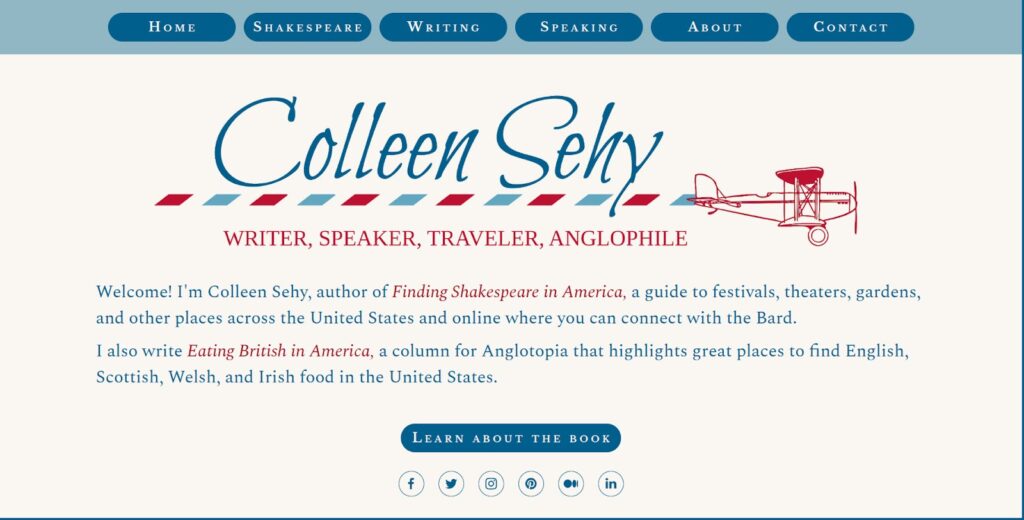
Many author websites have a very simple page structure, and you may never need more than a handful of pages.
Start with essential pages like the homepage, about page, books, and a contact page. From there, you might consider adding pages such as a media kit, podcast appearances, and speaking, but it’s fine for these to follow as a later phase of your project.
If you’re planning more than a few pages, and you’re a visual thinker, you might find it useful to map out the different pages that you’ll have on your website. Using a tool like Miro, you can sketch the sitemap before building.
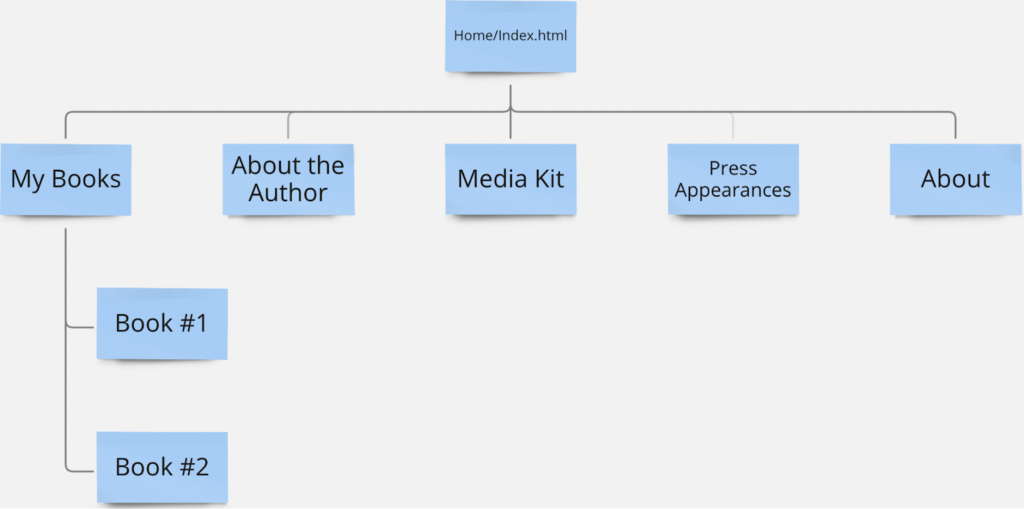
Tools and Plugins
Once you’ve got the basics under your belt, and if you’re serious about understanding your author business,you’ll probably choose to use some sort of analytics tool.
The most widely used tool is Google Analytics 4, but do realize there is a learning curve before you’ll feel comfortable. Instead, you might find your website provider offers simple built-in analytics. This is an option, for example, in both Squarespace and Wix.
When you’re ready for analysis, these tools will be helpful for not only determining how many views your website is getting but also which pages and sources (social media, search engines, direct) the views are coming from. Ideally, you’ll also want to measure the percentage of visitors navigating to book-specific pages, and clicks through link management tools.
Booklinker is great for this, as authors can embed one purchase call to action, that links to all different book stores, while also redirecting international readers to the correct Amazon page.

Free Universal Book Links
- Boost international sales by geotargeting readers
- Book store links update automatically based on availability
- Advanced marketing analytics
- Increase clicks with trusted links
Should Authors Blog?

One of the most common questions I get from my clients is whether or not they should blog.
Blogging has a lot of benefits such as making it easier to connect with your audience, develop writing habits, testing new material, and potentially bringing search engine traffic to your website.
However, blogging requires dedication and takes time away from other activities, like writing a new book. If an author isn’t genuinely passionate about blogging, sustaining the effort can be challenging.
If you do decide to blog for SEO goals, your posts should be created with search engines and target keywords in mind.
Blogs can be shared on social media as well as to your email list, however, keep in mind that social media posts typically have a shorter lifespan than traffic from search engines.
In my experience, non-fiction authors will find it easier to gain SEO traction from blogging as they can provide informative content that their audience is proactively searching for.
Fiction authors may struggle to identify searched-for topics for consistent blogging, however a novelist might still find other creative joy in writing and sharing short articles with their readers.
Some authors include a comment section on their website, in order to build relationships with their audience. If you decide to do this, modern best-practise is to enable comments only on your blog posts, and not on your main website pages.
For any author who doesn’t want to make a regular blogging commitment, writing occasional guest articles for other websites can be an extremely effective way to meet new readers and potentially bring some referral traffic.
Author Mailing List
Author mailing lists are one of the most powerful tools in an author’s arsenal for establishing and maintaining a direct relationship with your audience.
There’s no need to perpetually rely on social media or organic search algorithms, to remain top of your reader’s mind.
Booklinker has another article on email marketing for authors so I won’t go too in-depth here, but the focus shouldn’t be solely on selling the current/upcoming book, but on establishing a mutually beneficial relationship.
When done well, this then gives you the potential to promote your future books when the time is right.
Acquiring Subscribers
When first starting your email list, many subscribers will be acquaintances or those familiar with the author.
To grow your list, authors should provide incentives (lead magnets) like exclusive news, book giveaways, or valuable bonuses that your ideal reader cares about.
Most email marketing services will allow authors to facilitate the entire lead magnet process.
Your call to action should offer clear value to your potential subscribers, not just a generic “join my list.”

Your email list is a great way to build a connection with your audience. Many readers respond well to information about your author journey, books you’re reading, and reasons for writing.
Fiction authors can share behind-the-scenes content about their novels’ world, deleted scenes, and even ask for input. Non-fiction authors have the advantage of sharing valuable insights related to their subject.
Keep an eye on both your email open rates, and the number of replies you get, to gauge how well different types of material land with your audience.
There is no “perfect” frequency for sending your updates, although many authors seem to find their sweet spot with a monthly update. You need to find a cadence that you can sustain, where you’re offering something useful, interesting, or entertaining each time.
And since sending your newsletter takes time away from writing, don’t be afraid to keep your updates short and simple.
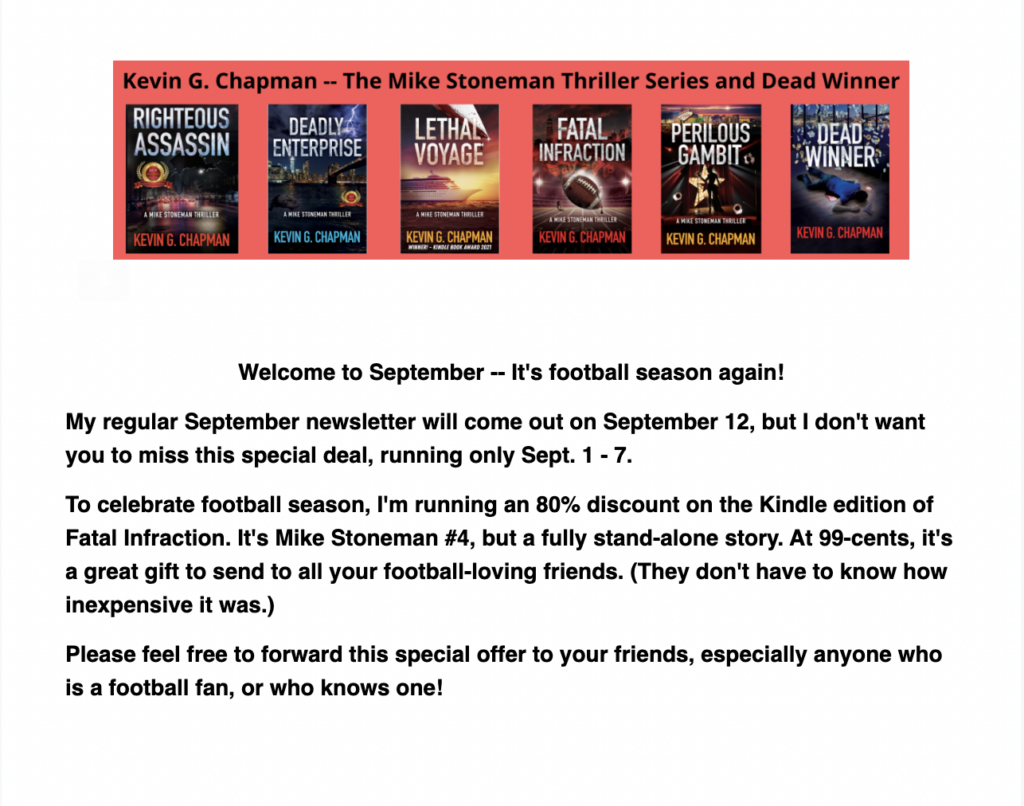
Promoting Your Author Website
Merely publishing a website doesn’t guarantee instant traffic. Authors need proactive strategies for audience discovery. While search engines can eventually drive traffic, most authors will need to identify where their ideal readers spend time, and engage there.
Don’t forget to include your website URLs in every book, inviting readers to sign up for lead magnets or other bonuses. Tracking links like Geniuslink can be used to determine how many site visitors come from book links.
To boost both your website traffic and book sales, many authors do well when they become active in niche communities related to their book themes.
For example, a book on how to write a memoir might appeal to senior communities, or recent retirees.
Effective book marketing requires time, effort, or financial investment (and usually, all three).
Some strategies include group collaborations, recommending each other’s books, and author events.
Almost all strategies require a long-term commitment, a desire to serve as well as to sell, and sustained effort.
Example Author Websites Analyzed
I wanted to finish this article by going over the websites of some of my past customers. In these examples, I’ll cover the different website elements they’ve included, and why.
Lisa Manterfield
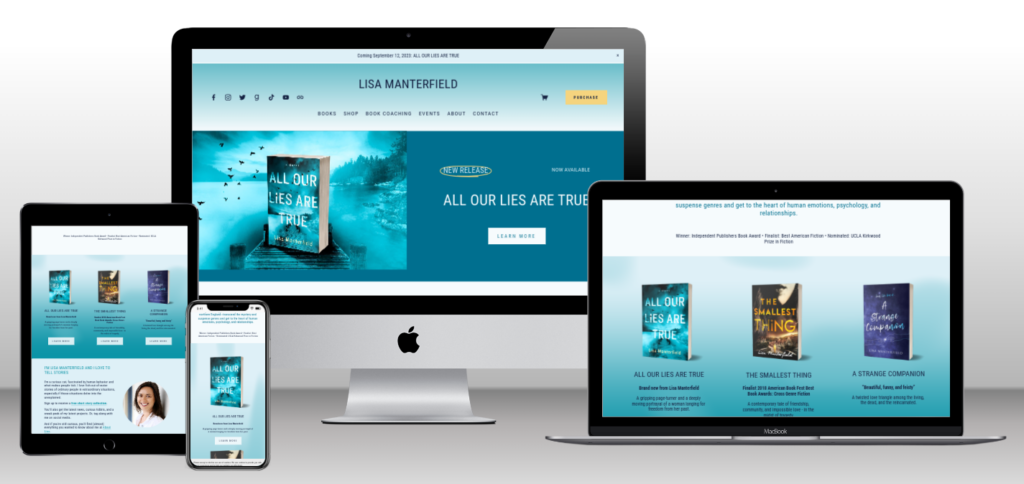
The first author website I want to take a look at is Lisa Manterfield’s. Lisa writes both fiction and nonfiction and has a sleek, modern, and mobile-responsive website.
You can see right away that the website highlights her latest release, with her other books shown further below. In my opinion, the large “paperback” cover images help make the books feel more real than a flat cover.
She’s also done a nice job of adding social proof via her independent reviews reader testimonials, and professional author photos.
Lisa provides links to all of her social media accounts in order for her fans to hear more frequent updates.

There’s also a dedicated section on every page where a collection of short stories is sent in exchange for a reader’s email.
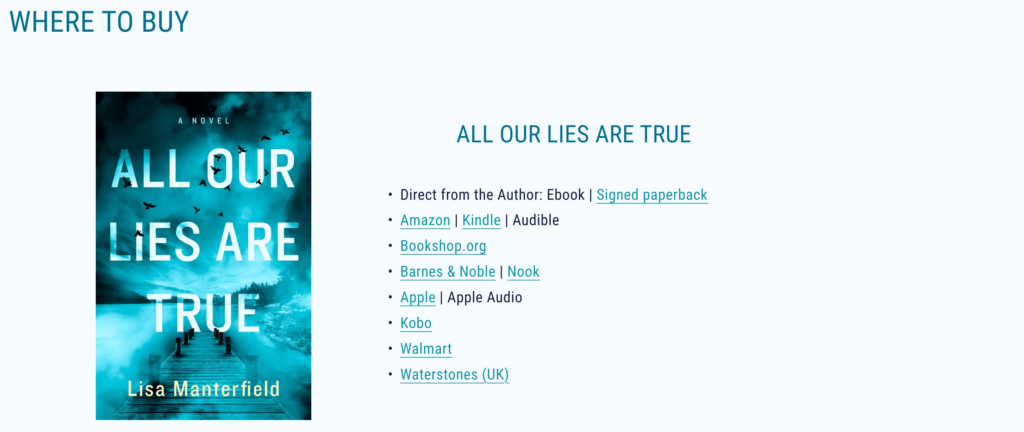
Lisa has dedicated pages on her website linking to the different bookstores her book is sold on. Lisa sells copies of her book directly from her website, allowing her to earn close to the entire value of her book. This is an advanced step, but recommended for authors with lots of traffic coming to their site.
Using a universal book link such as Booklinker or Geniuslink, she could condense this all down to one “Buy Now.”

Free Universal Book Link Generator
- Increase book link CTR via custom vanity URLs
- Boost international sales by geotargeting readers
- Book store links update automatically based on book availability
- Advanced marketing analytics
A few other things to point out are her up-to-date events page with information about her speaking gigs. The bio page has both a brief version, and an in-depth chance to get to know the author, for fans.
Lastly, the website comes with all of the privacy policies, store policies, and copyright notices you’d expect from an official author.
Garry Cole
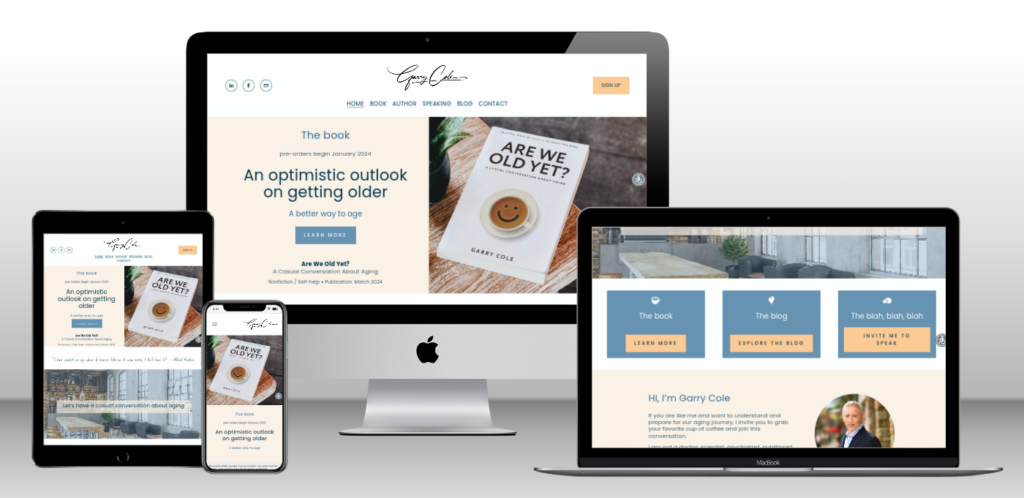
Garry Cole is a non-fiction author and another past client of mine.
His website is a little different then the above example as it’s live ahead of the publication date.
It has the essential best practices you’d expect, with its modern look, social links, and mobile responsiveness.
As his book is not out yet, he’s set up an appealing mockup of the book along with a “coming soon” section, with an invitation for interested readers to subscribe for news about the release.
Similar to Lisa’s website, he also has a speaking page where he lets interested parties contact him.
As Garry is purely a non-fiction author, he has a lot more opportunities with SEO and blogging. He’s got several blog posts up that get traffic, comments, and email signups, although he’s not receiving much organic traffic at the moment.

Conclusion
Your website sits at the center of your author marketing toolkit, but it’s not a silver bullet on its own. The most successful authors invest in a professional-quality, reader-centric website, and use it as part of their positioning and marketing for a long-term writing career.
That doesn’t mean your website needs to be a headache. Take the recommendations in this article in stages, and publish your basic pages before you then add more features, integrate your author mailing list, and promote your site. A simple, streamlined, modern website will support your work much better than a cluttered, dated muddle.
Whether you hire a website designer like me to build your site for you or take advantage of resources like my free author website starter kit, every author can benefit from a strong online home to showcase their books.
Author
-
Pauline Wiles is an indie author turned website designer who helps other authors create attractive websites that engage readers and sell more books. As an author herself, she noticed others were often overwhelmed by this task. Now, she’s helping to dispel the myths around how difficult a web project should be. British by birth, Pauline is now a contented resident of California, although she admits to an occasional yearning for afternoon tea and historic homes.



